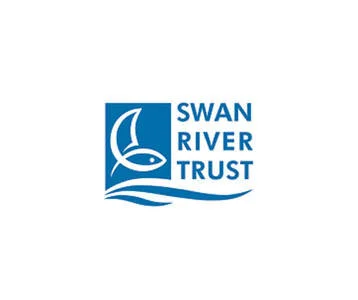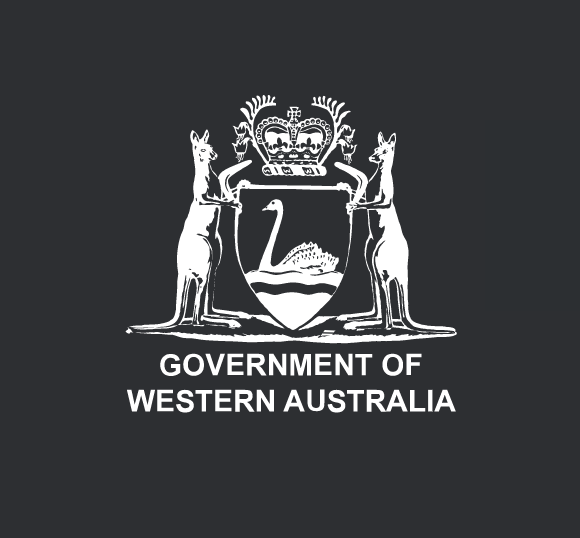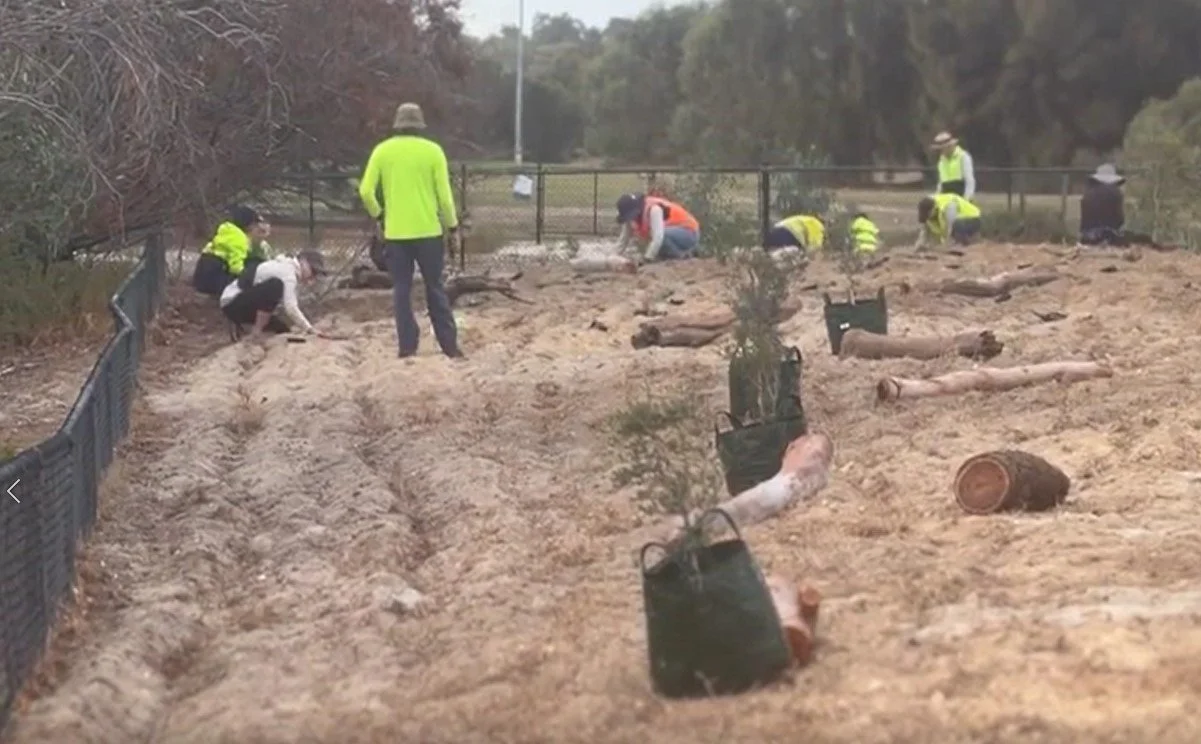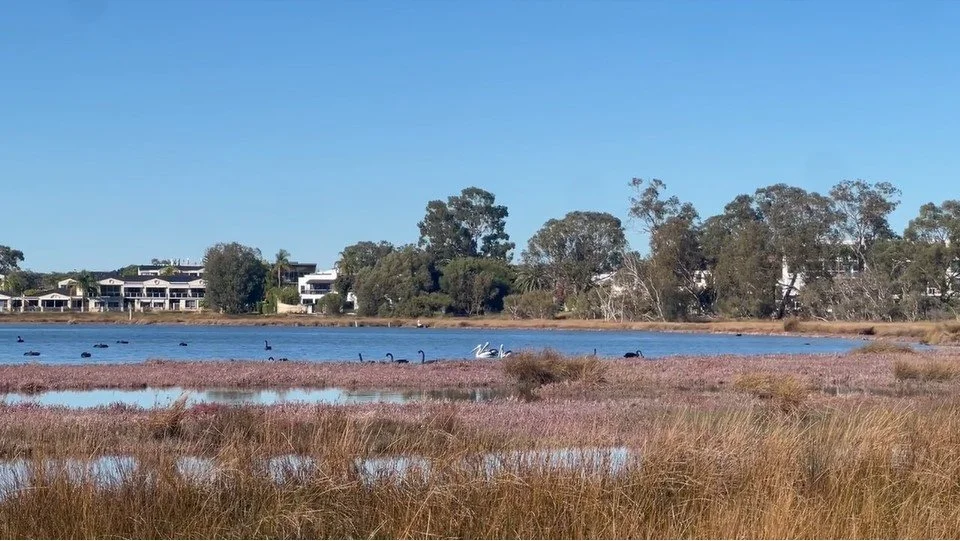
About Us
The Swan Estuary Reserves Action Group (SERAG) was formed in 2010 in response to a pressing need for action to ensure the long-term health and well-being of three very special areas in the Swan River Estuary that have been set aside by the wider community as the Swan Estuary Marine Park.
The reserves are Milyu in South Perth, Alfred Cove in Melville and Pelican Point in Crawley. Although small, they and their riparian margins serve as sanctuaries for native wildlife, including a plethora of local, nomadic and migratory birds, some of which are critically endangered.
They provide important feeding habitats for trans-equatorial migratory wading birds protected by agreements Australia has with Japan, China and Korea. The tiny Red-necked Stint is one such traveller.
Waders and waterbirds move between the three Reserves on a daily basis - their sand banks, mud flats and beaches providing the only remaining significant feeding, nesting and resting areas in the Swan River Estuary.
Concern about the health of our magnificent Swan River Estuary has been mounting over recent years.
Regrettably, the quality of our river water is under great pressure from regional agricultural and urban industrial and housing development activities, while the banks of the Swan and Canning Rivers are being cleared of native vegetation for dwellings and by those seeking river views, for transport systems and for an increasing variety of recreation activities.
The impact of climate change through declining rainfall, increasing temperatures and the unseasonal intensity of storms is already significant.
There are now very few remaining areas of the salt marsh, sedge banks and fringing forest that comprised the Estuary’s original vegetation; and even though at times we may see an abundance of birds such as swans, cormorants and pelicans, there are declining numbers of other species using the Estuary.
The Reserves are suffering under the pressures of incompatible urban activities and climate change. They are small, extremely fragile and significantly degraded. Hence they are in need of urgent support.
Watch these wonderful videos about SERAG’s work
By Michael 0’Donnell - Film and TV producer, reporter, author and researcher.
SERAG Tuesday morning volunteers
SERAG working to restore the Estuary

SERAG’s Objectives
Enhance the long-term ecological health of the Swan River Estuary A-Class Nature Reserves and adjacent river parks for the benefit of native flora and fauna and for the enjoyment of current and future generations of the Perth community.
Consistent with the first objective, support the managing authorities and those organisations involved in the restoration of the natural environment of the Swan River Estuary.
To these ends SERAG mobilises voluntary labour and other resources, applying for funding from various government programs and private institutions and working with other community organisations to support specific rehabilitation projects in the reserves. Such projects include: removing infestations of weeds and replacing them with sedges, shrubs and trees indigenous to the foreshore; managing erosion from boat-wash and winter storms, and installing structures such viewing platforms and informative signage to minimise human impact.
SERAG is also involved in educating the wider community about the conservation values of the reserves, and in encouraging behaviours that enhance and protect these values.
Membership
SERAG is representative of a wider community which places importance on the natural values of our iconic Swan River Estuary.
Membership is drawn mainly from Perth and surrounding districts but, given the Estuary's international importance, is not limited to these areas.
To become a member of SERAG, a person must be supportive of the two specific goals stated above and complete the Group’s Application Form.
Joining SERAG does not necessarily involve any commitment of time. Participation in our various projects and activities is always warmly welcomed, but entirely voluntary, and valuable contributions can be made in numerous ways.
Applications for membership must be endorsed by the Committee and, if successful, and a small membership fee is payable.
Application & renewal forms can be found here.
Operations
The Swan Estuary Reserves Action Group is an incorporated body registered as a charity with the Australian Charities and Not-for-profits Commission. It has its own constitution, ABN and bank account.
Each year at SERAG’s Annual General Meeting, a committee is formed whose work is to develop and manage strategies to support the group’s goals. The committee meets regularly throughout the course of the year, maintains minutes of its meetings and reports to the membership as a whole at the Annual General Meeting.
A regular newsletter is produced to keep members and friends informed of the group’s plans and activities and about opportunities for their involvement. Regular bush care and community education activities are held at various locations and are publicised in our Calendar of Events.
Committee
Each year at SERAG’s Annual General Meeting a committee is elected by the membership.
The committee's function is to faciliate the smooth operation of the group and to ensure that the energies of the organisation are focused on and directed towards achieving its two goals.
The five essential positions are Chairperson, Deputy Chairperson, Secretary, Treasurer and at least one general Committee Member.
The committee meets regularly to manage the group’s day-to-day functions and activities, which include applying for grants for restoration projects, coordinating bush-care activities, encouraging volunteer involvement, advocating for Estuary care, and fostering community awareness relating to the Swan Estuary’s three Marine Parks and associated reserves at Alfred Cove, Milyu and Pelican Point.
Our efforts are directed to hands-on restoration and conservation work, advocacy and community education.
To ensure effective communication between the Committee and the wider membership, a newsletter is produced and circulated three or four times a year.
A report on the group’s activities is also given at each Annual General Meeting.
Our Partners
-

Natural Resource Management (NRM)
The State Natural Resource Management Office was established by the State Government as a whole-of-government unit with the responsibility of managing the delivery of Commonwealth and State funding for natural resource management.
The Australian Government's Environmental Restoration funding and the State NRM funding are the two major funding sources overseen by the State NRM office.
The NRM supports planning and policy development and is involved in key project implementation with respect to the State’s natural resources. It maintains close relationships with community-based NRM groups and with community and industry groups involved with natural resource management.
-

Swan River Trust
The Swan River Trust is an advisory body providing high level strategic advice on the management and protection of the Swan and Canning Rivers.
The Trust is established by The Swan and Canning Rivers Management Act 2006. The Trust’s responsibilities include:
· developing policies;
· preparing strategic documents to improve initiatives of the Swan Canning Riverpark;
· overseeing the development and implementation of the Swan Canning River Protection Strategy; and
· providing advice and information on planning and development in the Swan Canning Riverpark
The Trust is part of the Department of Biodiversity Conservation and Attractions.
-

Department of Biodiversity, Conservation and Attractions
The Department of Biodiversity Conservation and Attractions (DBCA) has the primary responsibility on behalf of the people of Western Australia, for the environmental protection and conservation of the Swan Estuary Marine Parks and adjacent A-class Nature Reserves at Alfred Cove, Milyu and Pelican Point.
SERAG works closely with DBCA on restoration projects within the three areas by organising volunteers for weeding and planting days, by applying for and managing grants from various Government bodies for restoration projects, and by liaising with other volunteer organisations and corporate sponsors. SERAG helps bring all of these elements together to continue this vital conservation work.
-

City of Melville, City of South Perth and City of Perth
There are several small but vitally important remnant bushland areas abutting each of the three reserves and the adjacent foreshore areas of the Swan River Estuary. These are the responsibility of the local government authorities in which these lands are situated. As such, foreshore and parks near Milyu are the responsibility of the City of South Perth, those near Alfred Cove are the responsibility of the City of Melville and those adjacent to Pelican Point are the responsibility of the City of Perth.
All these local government authorities have produced environmental management plans or strategies, which aim to protect the conservation values of these foreshore and adjacent bushland areas. In many cases the land areas are part of Bush Forever Sites.
The City of South Perth contains approximately 11 kms of Swan River Estuary foreshore within its boundaries, of which 3 kms lie within the Milyu A-class Nature Reserve. The City of South Perth supports DBCA in maintaining and restoring Milyu.
The Main Roads Department has also been involved due to the proximity of the freeway to the foreshore. Its primary concerns have been run-off from road drains that empty onto the foreshore, the bicycle path which marks the boundary of Milyu along the length of the freeway and the erosion of the foreshore so close to a major road. As with the other A-class Nature Reserves, restoration necessarily involves extensive erosion control
SERAG has been working closely with City of Melville for many years particularly in some of the bushland areas within Bush Forever Site 331. In the case of the Swan River Estuary itself, the City of Melville has responsibility for 11 of the 18 kilometres of river foreshore within their boundary, and DBCA the remaining 7 kilometres.
Pelican Point and the adjacent Matilda Bay Reserve lie within the City of Perth boundaries, and are managed by DBCA. Together with JH Abrahams Reserve, these areas comprise Bushland Forever Site 402.
SERAG enjoys positive relationships with other organisations with supportive and complementary objectives.
We often host corporate volunteers and have developed programs involving student volunteers from both the University of Western Australia and Curtin University. Collaborations with community-based organisations with similar values are also highly productive and greatly appreciated.
Our membership of peak organisations such as the Conservation Council of Western Australia, the Urban Bushland Council and BirdLife Australia enables the sharing of important and relevant environmental information, to benefit and support the natural values of the Swan River Estuary.




